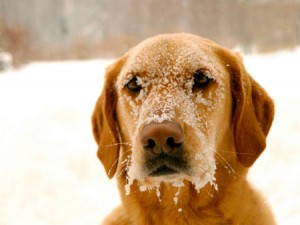WE’RE ALL DUNROAMIN’
Again, it is not just the DunRoamin’ group that advocates bringing pets indoors and making dogs part of the family instead of leaving them outside. Rather than re-invent the wheel, I would like to pass on these tips from the BC SPCA. They are very relevant here – a whole continent away.
COLD WEATHER PET TIPS

“Cold weather conditions can pose a serious risk to your pet,” said Lorie Chortyk, general manager of community relations for the BC SPCA. “Extra caution should be taken to ensure that your pet stays safe and healthy this winter.”
While the SPCA is vehemently opposed to keeping dogs permanently outdoors, it acknowledges that some pet guardians still house their dogs this way. In these cases, the dog must have shelter that protects him from heat, cold and dampness and is appropriate to his weight and coat. To accomplish this, the shelter should be elevated, insulated, ventilated and regularly cleaned.
Make sure you thoroughly clean the pads of your pet’s paws after they’ve walked on sidewalks or roads to remove any coarse salt that can cause irritation. For your own sidewalk choose a pet-friendly, non-corrosive de-icing compound readily available through retail outlets;
Use pet-safe propylene-based antifreeze instead of ethylene glycol antifreeze which is toxic to pets and wildlife. A mere tablespoon of ethylene glycol antifreeze can kill a cat or small dog;
“Think and Thump” before starting your car. Cats and wildlife gravitate to warm engines during cold weather. Banging on the hood before getting into your car can avoid a tragic ending for an animal seeking refuge from the cold.
The SPCA strongly urges keeping all animals indoors during cold weather, but if you must keep a domestic or farm animal outside, ensure they have access to shelter that is off the ground, provides protection from wind, cold and dampness and is properly insulated. Regular checks to ensure drinking water has not frozen over are also a must.
Pets often find the family Christmas tree an intriguing new play toy. Make sure your tree is well secured, place decorations above paw height and use string instead of hooks, which are easily dislodged. Make sure you don’t add chemicals or any other harmful substances to the water in your tree base.
Be cautious using holiday trimmings such as tinsel and candles which can cause injury for your pets.
Some holiday plants can be poisonous to animals. Keep mistletoe, holly, ornamental pepper and Christmas roses away from your pets.
Avoid giving turkey bones to your pets. Poultry bones easily splinter and the fragments can cause intestinal blockages or lacerations.
Chocolate and other sweets should not be given to pets. Chocolate contains theobromine, a chemical that can be deadly to cats and dogs.
Companion pets are not the only animals at risk in cold weather. People with farm animals must also make sure these animals have adequate cover from the elements and that all water containers are kept ice-free.
“When the temperature drops, we need to take extra care with our pets,” says Chortyk. “Ideally, we should keep our pets indoors with us where they are warm and safe and we enjoy their companionship.”
